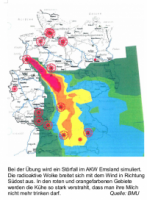A secret largescale simulation of an atomic disaster at a German nuclear power plant in Lingen ended in disaster on 17 September because crisis managers at national and state levels fought over responsibilities. The shocking outcome was revealed by the investigative leftwing daily newspaper, taz in October, citing 1,000 pages of internal ministerial protocols and files. In a real situation a radioactive cloud would have moved southeast from Lingen across Osnabrück, Steinfurt, Warendorf, Gütersloh and Bielefeld before authorities had alerted people to the danger.
Only because of the assumed wind direction, cities like Münster and Hamm were spared the first atomic cloud; had a different wind been assumed they, too, would have been hit by the fallout unprepared.
Taz reported that despite this disaster the federal environment ministry had drawn no conclusions from the failure of the emergency exercise by the time it published its story.
“This exceeds the worst fears. It appears that in a real situation the German authorities appear to be unable to adequately inform and protect the population in case of a maximum credible accident. Why was this exercise kept secret? Why have no consequences been drawn yet? If the authorities are unable to protect the population in case of grave atomic accidents, the federal environment ministry must immediately close down all atomic installations,” commented Willi Hesters of the Aktionsbündnis Münsterland gegen Atomanlagen (Münsterland Alliance Against Atomic Installations).
The simulated worst case scenario in Lingen, where there is also a nuclear fuel factory, is particularly controversial because earlier this year the precautionary areas for atomic accidents were drastically enlarged. Under these new rules all areas within a 20-kilometre radius of nuclear power stations would have to be evacuated within 24 hours; within a radius of 100 kilometres people would have to stay indoors and take iodine tablets.
“This exercise showed how unrealistic this scenario is. While the radioactive cloud spreads from Lingen across the countryside, farmers are still to bring in their harvest and people find out much too late about the fallout. And if communication doesn’t work at the highest level between federal and state governments, how is it supposed to work at lower level between the states, counties and municipalities? A disaster beyond all expectations is unmanageable at administrative level,” argues Matthias Eickhoff of the activist group SOFA (Immediate Atomic Shutdown Münster).

